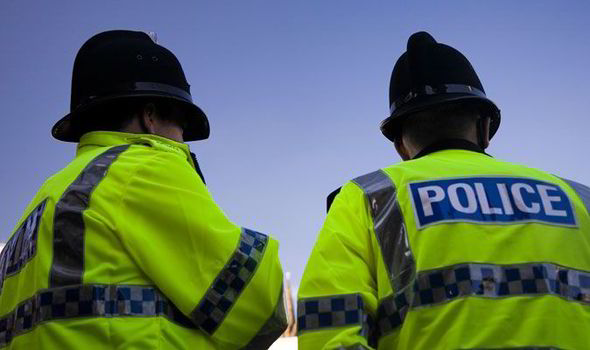News
Become a Special Constable in 2017

 DYFED-POWYS POLICE is recruiting volunteers to join their Police family as Special Constables in Carmarthenshire, Pembrokeshire, Ceredigion and Powys.
DYFED-POWYS POLICE is recruiting volunteers to join their Police family as Special Constables in Carmarthenshire, Pembrokeshire, Ceredigion and Powys.
Special Constables work alongside full-time police officers and have the same powers as a police officer whilst on duty, helping to provide a link between the police and our communities.
Working as a Special Constable can be done alongside studying, other employment or in retirement. You can use your experience from jobs and life to provide a different perspective and way of looking at some of our policing challenges.
Catrin Morgan, a Special Constable who also works full-time in Dyfed-Powys Police headquarters, said: “I’m working in full time catering at the moment so this is very different and exciting. Since working in the canteen and having the opportunity to speak to PCSOs and PCs I’ve found the job very interesting and wanted to have a good insight into their role. By being a Special Constable you’re able to see how the police work without giving anything up – I’ve still got my job but I’m giving back to the community.
“I started my training in January 2016 and had my ‘passing out’ in April. I work 16 hours a month – four hours per week – and can work more that if I want to. Each shift is different, from day to day and hour to hour.
“I would definitely recommend becoming a Special, if somebody does want to join the police force it’s a very good way to gain an insight without giving anything up. If you do like the role it’s a good way to become a full-time police officer.”
Dyfed-Powys Police is looking for enthusiastic people who have a special quality and are willing to volunteer their time to join the force as Special Constables in Carmarthenshire, Pembrokeshire, Ceredigion and Powys.
You will receive the necessary and appropriate training to allow you work alongside full-time police officers. You will have the same powers as a police officer whilst on duty, and help provide a link between the police and local communities.
An application pack and further information about the role is available on their website: http://bit.ly/2ioGkHj
To apply, complete and return the Special Constable Application form by midnight on Thursday (Jan 5).
Crime
Emergency bags rolled out to support domestic abuse victims across Dyfed-Powys

Thirty packs provide immediate help for families fleeing dangerous situations
A NEW initiative aimed at supporting victims of domestic abuse has seen thirty emergency bags distributed for use across the Dyfed-Powys Police area.
The bags, which contain essential items including toiletries, non-perishable snacks and emergency supplies, are designed to offer immediate practical support to individuals and families forced to flee abusive situations, often with little or nothing.
The scheme forms part of the Police and Crime Commissioner’s wider commitment to improving outcomes for victims and is being delivered in partnership with Dyfed-Powys Police and Dal i Godi, the commissioned Independent Domestic Violence Adviser (IDVA) service.
Dal i Godi provides specialist support to victims at high risk of serious harm, including safety planning and advocacy through the criminal justice process.
Police and Crime Commissioner Dafydd Llywelyn said the initiative was already proving its value.
“This is an incredible initiative that I’m proud to support,” he said. “It provides meaningful help to those experiencing trauma and reflects our ongoing work to put victims first.
“Within just a few days of the bags being distributed to the Dal i Godi service, one was given to a victim fleeing a domestic abuse situation, along with a children’s pack to support their young family. That shows just how essential this support can be and how quickly it can make a difference.”
Detective Chief Inspector Llyr Williams, from the Dyfed-Powys Police Vulnerability Hub, said the emergency bags could provide a vital lifeline at critical moments.
“These emergency bags offer support at some of the most difficult moments in a person’s life,” he said.
“The contents provide immediate comfort, dignity and practical help for those leaving their homes in crisis. While simple, they represent an important first step towards safety and recovery.
“We are proud to be working with partners across the Dyfed-Powys area to ensure this support reaches people when they need it most.”
Anyone experiencing domestic abuse, or concerned about someone else, is encouraged to seek help. In an emergency, call 999.
Domestic abuse can also be reported online via Dyfed-Powys Police.
Support services available include Victim Support Dyfed-Powys, which offers free and confidential help to anyone affected by crime, whether or not it has been reported, and Dal i Godi, which provides specialist IDVA support for high-risk victims.
The Live Fear Free Helpline offers 24-hour support for those experiencing domestic abuse or sexual violence across Wales.
If you or someone you know is a victim of domestic abuse, please consider reporting it. If you are in danger or need support right away, please call 999.
You can report domestic abuse through the online crime reporting service here: Report domestic abuse | Dyfed-Powys Police.
Support is also available via the below support services:
Victim Support Dyfed-Powys
Free, independent support for anyone affected by crime in the Dyfed-Powys area, whether or not it has been reported to the police.
0300 123 2996
Dal i Godi (IDVA Service)
Specialist support for victims of domestic abuse at high risk, offering safety planning, emotional support, and advocacy with agencies such as police and courts.
01267 221194
Live Fear Free Helpline
24/7 support for anyone experiencing domestic abuse or sexual violence.
0808 80 10 800 | Text 07860 077333
News
Welsh-language school praised for ‘happy, proud and friendly community’

Estyn highlights strong leadership, positive attitudes and a clear curriculum vision at Ysgol Bro Preseli
A WELSH-medium all-age school in Crymych has been praised by inspectors for fostering a “happy, proud and friendly community,” according to a recent Estyn report.
Inspectors said pupils at Ysgol Bro Preseli show pride in their local area, thrive both academically and socially, and are well prepared for the next stages of their learning.
The school currently has 932 pupils on roll, including 118 in the sixth form, and has operated as an all-age school since 2022.
Estyn found that most pupils demonstrate extremely positive attitudes to learning, treat staff with respect, and listen carefully to the contributions of their peers.
The report also notes that, in almost all cases, teachers show strong subject knowledge. Inspectors highlighted the close and supportive relationships staff build with pupils, alongside the creation of a safe learning environment where pupils are not afraid to make mistakes.
It states: “As a result of a clear strategic direction and detailed planning, teachers provide beneficial practical activities that allow pupils to develop purposeful oracy, reading and writing skills in language sessions and across the other areas of learning and experience.”
Inspectors also praised the school’s clear curriculum vision, rooted in its motto Gwreiddiau a Gorwelion (Roots and Horizons).
“Leaders and teachers provide a coherent curriculum and learning experiences that bridge the primary and secondary sectors effectively,” the report said. “Staff plan stimulating activities and experiences for pupils to learn and deepen their understanding within the areas of learning and experience. This contributes positively to the sense of belonging that permeates the whole curriculum of Ysgol Bro Preseli.”
Headteacher Rhonwen Morris said the report was a reflection of the collective effort across the school community.
“As a successful all-age Welsh-medium school, we are delighted that the report recognises our commitment to excellence and the unique identity that makes Ysgol Bro Preseli so special,” she said.
“Since becoming an all-age school in 2022, our cohesive leadership team and governing body have focused on building a strong foundation based on our values of Welsh ethos, kindness, community and responsibility.
“The report highlights the excellent strategic work of staff at all levels, which is a testament to the shared dedication and vision that drives our school forward.
“It is gratifying that the report reflects what we continuously aim to achieve day in and day out. This achievement belongs to our entire community — staff, pupils, parents and governors — and together we will continue to build on this success and provide the very best education for every pupil.”
Charity
Welsh opticians raise £1,600 for people experiencing homelessness

SPECSAVERS Pembroke Dock has helped raise £1,600 to support people experiencing homelessness this winter, with all funds going to The Wallich’s winter appeal.
Thirteen stores from North, South and West Wales donated £1 for every customer feedback form completed during November to help The Wallich, Wales’ largest homelessness and rough sleeping charity, continue its vital work.
Supporting more than 8,000 people experiencing or at risk of homelessness across the nation each year, The Wallich runs around 100 diverse projects across 20 local authorities to provide hope, support and solutions to end homelessness.
Funds raised by Specsavers will go directly to the Wallich’s Flexible Assistance Fund, which provides small but vital emergency grants. The grants support people at crucial turning points, helping cover essential costs such as phone credit, rent or food shops.
This initiative is a continuation of Specsavers’ wider homelessness programme, which sees over a hundred Specsavers stores and Home Visits services hold out-of-hours or pop-up clinics and invite people affected by forms of homelessness to use their services for free.
Specsavers’ North Wales regional relationship manager, Martin Lawrence, who helped organise the fundraiser, says: ‘We’re really proud to be supporting The Wallich’s winter appeal at a time when support is needed most.
‘Homelessness affects people in every community and as locally owned and run businesses, Specsavers stores are committed to raising awareness of the issue and supporting people through their toughest moments.
‘We’re excited to build on the success of this fundraiser and strengthen our partnership with The Wallich in the new year.’
Louisa Turner, head of fundraising at The Wallich, adds: ‘Winter can be an incredibly difficult time for people experiencing homelessness and this support from Specsavers will make a real difference.
‘The funds raised will help provide emergency grants at critical moments – whether that’s putting food on the table, helping someone stay connected with their loved ones or preventing someone from losing a safe place to live.
‘This kind of support creates vital turning points and helps people move towards a safer, more secure future.’
Specsavers works year-round with homelessness charities including Crisis, Vision Care and The Big Issue, to improve access to healthcare and advocate for policy change – ensuring people experiencing homelessness can receive free eye tests, glasses and hearing checks.
To find out more about Specsavers or to book an appointment at your local store, visit: https://www.specsavers.co.uk/stores.
-

 Crime2 days ago
Crime2 days agoMilford Haven man jailed after drunken attack on partner and police officers
-

 News5 days ago
News5 days agoDyfed-Powys Police launch major investigation after triple fatal crash
-

 Crime2 days ago
Crime2 days agoTeenager charged following rape allegation at Saundersfoot nightclub
-

 Crime3 days ago
Crime3 days agoMan charged with months of coercive control and assaults
-

 Crime4 days ago
Crime4 days agoMan sent to Crown Court over historic indecent assault allegations
-

 Crime6 days ago
Crime6 days agoMan spared jail after baseball bat incident in Milford Haven
-

 Crime4 days ago
Crime4 days agoMilford Haven man admits multiple offences after A477 incident
-

 Crime3 days ago
Crime3 days agoWoman ‘terrified in own home’ after ex breaches court order


















